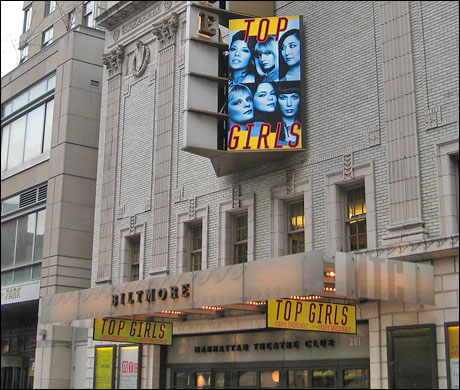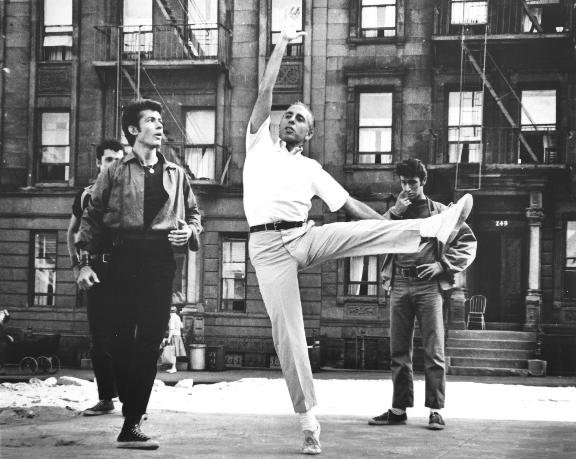“Reality does not conform to the ideal, but confirms it.”
Gustave Flaubert, Pensées
Archives for May 2008
FILM
The Westerner. Gary Cooper has been largely overlooked by postmodern film buffs, but a new DVD reissue of this 1940 film might help break through the wall of silence. Directed by William Wyler, The Westerner is a fictionalized retelling of the not-entirely-legendary tale of Roy Bean, the hard-drinking self-made Texas judge who dispensed Law West of the Pecos and had a thing for Lillie Langtry, the celebrated turn-of-the-century British actress. Walter Brennan won and earned an Oscar for his scene-stealing performance as Judge Bean, but Cooper gets plenty of licks in as a dryly amusing drifter who slips out of the judge’s noose by falsely claiming to know the Jersey Lily. Hijinks ensue, climaxing in a spectacular showdown. You’ll know who wins well before the first shot is fired, but all the fun is getting there. Gorgeous cinematography by Gregg “Citizen Kane” Toland (TT).
PLAY
Boeing-Boeing (Longacre Theatre, 220 W. 48). Bliss comes to Broadway in the unlikely form of a half-remembered French comedy that crashed and burned when it last played the Great White Way in 1965. Marc Camoletti’s seven-door farce, in which two hapless bachelors juggle three sexy stewardesses and a haughty Parisian maid, is feather-light, totally dated, utterly irrelevant, and rib-crackingly funny, in large part because of the brilliant performances of Mark Rylance and Christine Baranski. Give your brain a night off and do some serious laughing (TT).
CD
Hilary Hahn, Schoenberg/Sibelius Violin Concertos (DGG). America’s best young classical violinist has taken on a real nutcracker this time around: Arnold Schoenberg’s 1936 concerto, a finger-twistingly hard piece of twelve-tone neoromanticism that sounds like Brahms gone bonkers. Even if you don’t buy Schoenberg’s music–which I don’t–you’ll find this specimen perversely fascinating, and Hahn has taken out a gilt-edged accident insurance policy by coupling it with Sibelius’ ever-popular D Minor Concerto. Needless to say, the violin playing is fabulous, and Esa-Pekka Salonen and the Swedish Radio Symphony Orchestra provide immaculate support (TT).
BOOK
William Maxwell, Early Novels and Stories (Library of America, $35). How did I fail to laud this collection when it came out earlier this year? Too busy, I guess, but it’s never too late to sing the praises of Maxwell, a legendary New Yorker fiction editor who doubled as one of this country’s most remarkable and least appreciated novelists. The Folded Leaf, written in 1945 and included in this collection, is the place to start, a deeply intelligent tale of adolescence angst that avoids all the pitfalls common to that genre. Also included is “The Writer as Illusionist,” a 1955 essay in which Maxwell discussed his soft-spoken art with characteristic acuteness (TT).
TT: Seven girls grumbling
The 2007-08 Broadway season is now officially over, and in today’s Wall Street Journal column I report on the last show to open in time for this year’s Tony nominations,
I also had a few words to say about Glory Days, the sensitive-teen musical that opened–and closed–on Tuesday.
Here’s an excerpt.
* * *
 I can’t tell you how “Top Girls” looked in 1983, but today it is a creaky period piece, by turns clever-clever and brutally heavy-handed, in which Ms. Churchill strenuously endeavors to portray the upwardly mobile career women of the Thatcher era as bitchy, self-hating beasts who have fallen victim to the virus of American individualism and so lost their souls. Marlene (Elizabeth Marvel), the head of the bitch pack, runs an employment agency that finds high-paying jobs for monsters of ambition. In due course we learn that she has deserted her working-class family–and her illegitimate daughter–in order to come to London to shinny up the greasy pole. At play’s end she visits her home in Suffolk, where her sister (Marisa Tomei) spits venom in her eye: “I suppose you’d have liked Hitler if he was a woman. Ms. Hitler. Got a lot done, Hitlerina.” No doubt Ms. Churchill meant for us to be stunned into agreement by the pungency of this assault on the evils of Thatcherism, but all it did was make me look at my watch….
I can’t tell you how “Top Girls” looked in 1983, but today it is a creaky period piece, by turns clever-clever and brutally heavy-handed, in which Ms. Churchill strenuously endeavors to portray the upwardly mobile career women of the Thatcher era as bitchy, self-hating beasts who have fallen victim to the virus of American individualism and so lost their souls. Marlene (Elizabeth Marvel), the head of the bitch pack, runs an employment agency that finds high-paying jobs for monsters of ambition. In due course we learn that she has deserted her working-class family–and her illegitimate daughter–in order to come to London to shinny up the greasy pole. At play’s end she visits her home in Suffolk, where her sister (Marisa Tomei) spits venom in her eye: “I suppose you’d have liked Hitler if he was a woman. Ms. Hitler. Got a lot done, Hitlerina.” No doubt Ms. Churchill meant for us to be stunned into agreement by the pungency of this assault on the evils of Thatcherism, but all it did was make me look at my watch….
Many Broadway shows have closed after just one night, but only a few have been musicals. The last new musical to explode as soon as the key was turned was Alan Jay Lerner’s “Dance a Little Closer” in 1983. Thus “Glory Days” has won itself a place in history: Henceforth it will be mentioned alongside such famous flops as Leonard Bernstein’s “1600 Pennsylvania Avenue” (seven performances), Mickey Leonard’s “The Yearling” (four performances), Stephen Sondheim’s “Anyone Can Whistle” (nine performances) and “Merrily We Roll Along” (16 performances), Charles Strouse’s “Nick & Nora” (nine performances) and Jule Styne’s “The Red Shoes” (five performances).
What all these older flops have in common is that, like “Dance a Little Closer,” they were the work of distinguished artists, and some had memorable scores to boot. “The Yearling” actually yielded up a standard, “I’m All Smiles,” while “Anyone Can Whistle” and “Merrily We Roll Along” have both turned out to be much hardier than they looked at first glance. As for Nick Blaemire and James Gardiner, the authors of “Glory Days,” they are 23 and 24 years old respectively, young enough to someday earn themselves a second grab at the brass ring of theatrical success. Stranger things have happened: Six years after “Anyone Can Whistle” blew up in Mr. Sondheim’s face, he wrote “Company” and became immortal. So I’ll keep my opinion of “Glory Days” to myself and instead wish its makers the best of luck in their future endeavors. They’ll need it, and maybe they’ll get it.
* * *
Read the whole thing here.
TT: The all-American choreographer
 Jerome Robbins is all over the place these days. New York City Ballet is presenting a month-long Robbins Celebration at Lincoln Center, while Patti LuPone is burning up the stage of the St. James Theatre in an Arthur Laurents-staged revival of Gypsy that incorporates the dances choreographed by Robbins for the show’s original 1959 production.
Jerome Robbins is all over the place these days. New York City Ballet is presenting a month-long Robbins Celebration at Lincoln Center, while Patti LuPone is burning up the stage of the St. James Theatre in an Arthur Laurents-staged revival of Gypsy that incorporates the dances choreographed by Robbins for the show’s original 1959 production.
The coincidence of these two events struck me as a highly suitable occasion for a “Sightings” column in which I take a retrospective look at Jerome Robbins’ place in postwar American culture. During his lifetime, Robbins was America’s most famous choreographer–but ten years after his death, does the co-creator of Fancy Free, West Side Story, and Dances at a Gathering still matter? Or has the ever-changing Zeitgeist finally passed him by?
To find out, pick up a copy of Saturday’s Wall Street Journal, turn to the “Weekend Journal” section, and see what I have to say in “Sightings.”
UPDATE: Read the whole thing here.
TT: Almanac
“I did deeply want to create, by means both austere and rich–means always disciplined by a central aesthetic–an experience that was entirely and only theatrical.”
Peter Shaffer, preface to The Royal Hunt of the Sun (courtesy of Marissabidilla)
